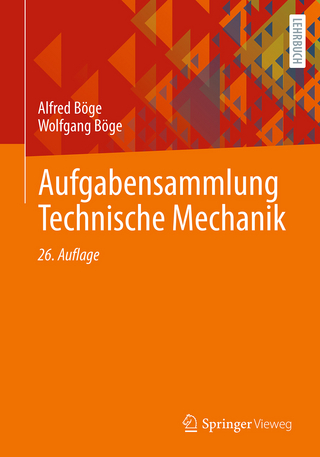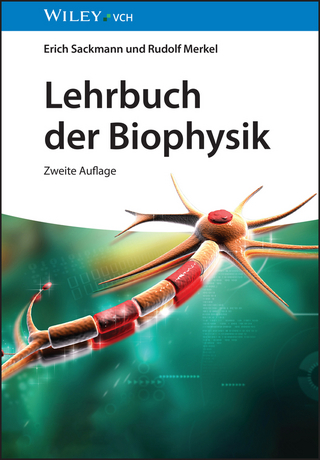Acoustic technologies in biology and medicine
Wiley-VCH (Verlag)
978-3-527-35062-9 (ISBN)
First, this book covers the underlying physical and theoretical principles of acoustic technologies. Second, different technologies of acoustic systems including bulk and surface acoustic wave-based platforms, acoustic imaging, acoustic sensors and acoustic levitators are discussed. Third, state-of-the-art applications of acoustics in biology and medicine are presented. These applications include single cell and organism manipulation, acoustic biosensing, cancer cell isolation (liquid biopsy), cell/tissue stimulation and ablation, micro-robot actuation, acoustic imaging, and drug delivery.
Comprehensive: provides fundamental principles of acoustic wave generation and propagation, different acoustic systems and technologies with the interplay of physical forces, theoretical foundations, and the state-of-the-art biomedical applications of acoustics
Application-oriented: a balanced presentation of technical details, theoretical depth, and interdisciplinary applications on acoustic biosensing, cancer cell isolation, cell/tissue stimulation and ablation, micro-robot actuation, acoustic imaging, and drug delivery
Interdisciplinary: brings together expertise from fluid mechanics, physics, chemistry, electronics, and the life sciences
Adem Ozcelik received his B.Sc. degree in Physics from Karadeniz Technical University, Turkey in 2007. He then received his M.S. degree in Materials Science and Engineering in 2011 and Ph.D. degree in Engineering Science and Mechanics in 2016 from The Penn State University, USA. He worked as a Postdoctoral Associate in Mechanical Engineering and Materials Science Department at Duke University, USA (2016-2017). Currently, he is an Asst. Prof. of Mechanical engineering at Aydin Adnan Menderes University, Turkey. His research interest includes biomedical applications of micro/nano electromechanical systems (BioNEMS/BioMEMS), microfluidics, micro-total-analysis-systems, acoustofluidics, and materials science. He authored and coauthored 25 peer-reviewed journal publications and book chapters.
Ryan Becker is a biomedical engineer, scientist, and entrepreneur completing his PhD in biomedical engineering at Duke University. Currently, his research encompasses the design and development of wearable electronics and acoustic systems for continuous biometric monitoring of humans in space and on earth. With strong backgrounds in both biology and engineering, he strives to create technologies at the interface of these disciplines that revolutionize our interactions with point-of-care diagnostics. Becker has published his findings in numerous academic journals, and as an entrepreneur has worked to commercialize his research.
Tony Jun Huang is the William Bevan Distinguished Professor of Mechanical Engineering and Materials Science at Duke University. Previously he was a professor and the Huck Distinguished Chair in Bioengineering Science and Mechanics at The Pennsylvania State University. He received his Ph.D. degree in Mechanical and Aerospace Engineering from the University of California, Los Angeles (UCLA) in 2005. His research interests are in the fields of acoustofluidics, optofluidics, and micro/nano systems for biomedical diagnostics and therapeutics. He has authored/co-authored over 250 peer-reviewed journal publications in these fields. His journal articles have been cited more than 21,000 times, as documented at Google Scholar (h-index: 80). He also has 26 issued or pending patents. Huang?s research has gained international recognition through numerous prestigious awards and honors including a 2010 National Institutes of Health (NIH) Director?s New Innovator Award, a 2012 Outstanding Young Manufacturing Engineer Award from the Society for Manufacturing Engineering, a 2013 American Asthma Foundation (AAF) Scholar Award, JALA Top Ten Breakthroughs of the Year Award in 2011, 2013, and 2016, the 2014 IEEE Sensors Council Technical Achievement Award, the 2017 Analytical Chemistry Young Innovator Award from the American Chemical Society (ACS), the 2019 Van Mow Medal from ASME, and the 2019 Technical Achievement Award from the IEEE Engineering in Medicine and Biology Society (EMBS).
1: Fundamentals of acoustic wave generation and propagation
2: Basic theories and physics of acoustic technologies
3: Materials for acoustic wave generation and modulation
4: Ultrasound imaging
5: Photoacoustic imaging and sensing for biomedical applications
6: Therapeutic ultrasound
7: Application of ultrasound responsive reagents for drug delivery systems
8: Acoustic levitation and acoustic holograms
9: Application of ultrasonic waves in bioparticle manipulation and separation
10: Acoustic Biosensors
11: Acoustic micro and nanorobots in medicine
| Erscheinungsdatum | 15.11.2023 |
|---|---|
| Zusatzinfo | 104 Abb., 95 Farbabb. |
| Verlagsort | Weinheim |
| Sprache | englisch |
| Maße | 170 x 244 mm |
| Gewicht | 900 g |
| Einbandart | gebunden |
| Themenwelt | Naturwissenschaften ► Chemie |
| Naturwissenschaften ► Physik / Astronomie ► Angewandte Physik | |
| Technik ► Elektrotechnik / Energietechnik | |
| Technik ► Medizintechnik | |
| Technik ► Umwelttechnik / Biotechnologie | |
| Schlagworte | Biologie • Chemie • Chemistry • Medical & Health Physics • Medical Science • Medizin • Pharmaceutical & Medicinal Chemistry • Pharmazeutische u. Medizinische Chemie • Physics • Physik • Physik in Medizin u. Gesundheitswesen • Radiologie • Radiologie u. Bildgebende Verfahren • Radiology & Imaging |
| ISBN-10 | 3-527-35062-4 / 3527350624 |
| ISBN-13 | 978-3-527-35062-9 / 9783527350629 |
| Zustand | Neuware |
| Informationen gemäß Produktsicherheitsverordnung (GPSR) | |
| Haben Sie eine Frage zum Produkt? |
aus dem Bereich




